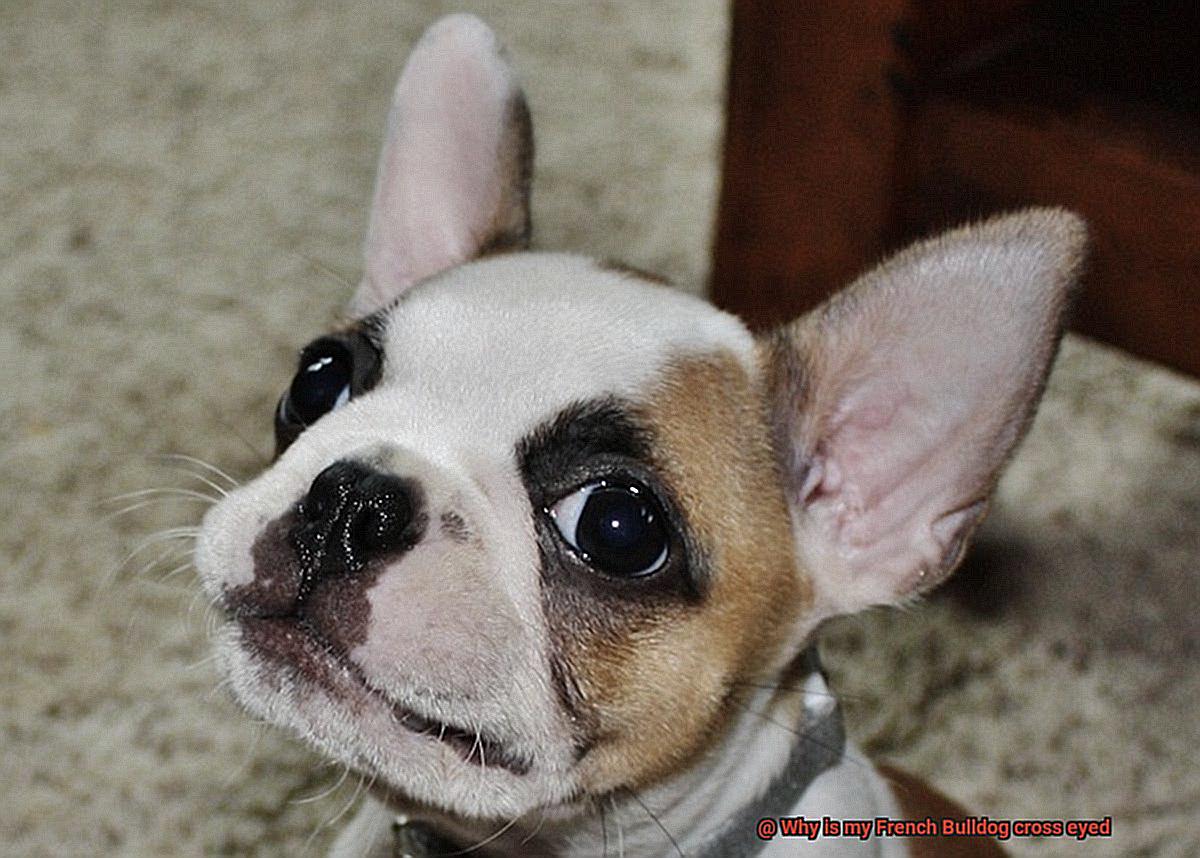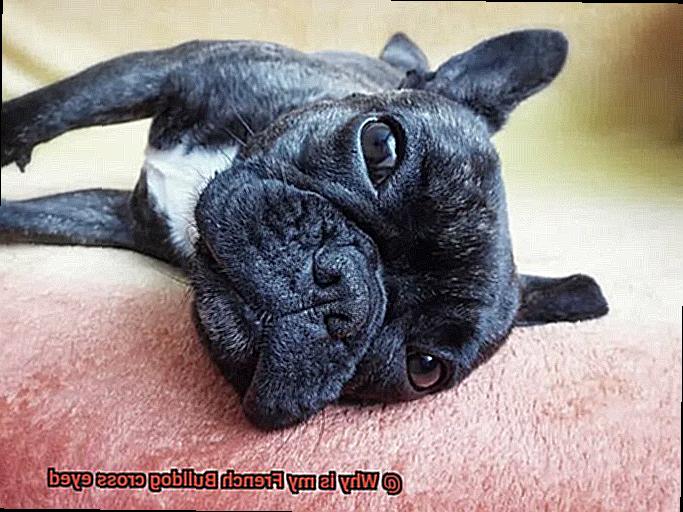Why is my French Bulldog cross eyed?
Have you ever found yourself captivated by the perplexing sight of your French Bulldog’s eyes wandering in different directions? Don’t worry, you’re not alone. Crossed eyes, or strabismus as it’s scientifically known, have long fascinated dog owners, adding an extra touch of charm to these lovably quirky companions.
While this endearing trait might raise eyebrows and spark conversations at the local dog park, fear not, for it is usually harmless. But have you ever pondered what lies behind this enchanting peculiarity in your furry friend?
In this blog post, we’ll embark on a fascinating journey through the world of French Bulldog genetics and anatomy to uncover the peculiar reasons behind their cross-eyed allure. This adorable trait, unique as it may be, finds its roots in a combination of genetics and breed-specific characteristics that set French Bulldogs apart.
Brace yourself for an eye-opening exploration into the enigmatic phenomenon of crossed gazes, shedding light on the mysteries surrounding our beloved four-legged companions.
What is Strabismus?
Contents
French Bulldogs are beloved companions known for their adorable appearance and playful personalities. However, these charming dogs can also experience health conditions, one of which is strabismus. Strabismus, also known as cross-eyedness, is a condition in which the eyes are misaligned.
In this blog post, we will delve into the intriguing world of strabismus in French Bulldogs, exploring its causes, effects, and available treatment options.
Causes of Strabismus in French Bulldogs:
- Genetic Predisposition: Some French Bulldogs inherit genes that make them more prone to eye abnormalities like strabismus. A family history of crossed eyes increases the likelihood of a French Bulldog developing this condition.
- Developmental Issues: The unique facial structure of French Bulldogs, with their flattened face and shortened muzzle, can sometimes lead to abnormal eye development. This can result in misalignment or cross-eyedness.
- Trauma or Injury: Accidents or injuries that affect the muscles or nerves around the eyes can disrupt their normal alignment and lead to strabismus in French Bulldogs.


Effects of Strabismus on French Bulldogs:
While strabismus may not cause pain or discomfort for French Bulldogs, it can have significant effects on their vision and overall well-being. The misaligned eyes can result in double vision or poor depth perception. Additionally, strabismus can cause discomfort or irritation in the affected eye and may lead to complications such as corneal ulcers or conjunctivitis if left untreated.
Treatment Options for Strabismus:
- Conservative Measures: In some cases, no treatment may be required if the dog is not experiencing any issues related to their crossed eyes. Regular monitoring by a veterinarian is essential to detect potential complications early.
- Corrective Lenses or Eyeglasses: Depending on the severity of the condition, corrective lenses or eyeglasses may be prescribed to improve vision and alignment.
- Surgical Intervention: If conservative measures prove ineffective or if there is a structural abnormality in the eye, surgical intervention may be necessary. The goal of surgery is to restore proper alignment and optimize visual function.
Causes of Cross-Eyedness in French Bulldogs
Cross-eyedness, also known as strabismus, is a condition that can affect French Bulldogs, causing their eyes to misalign. In this blog post, we will explore the various causes of cross-eyedness in French Bulldogs to help you better understand why your furry friend might be sporting those irresistible crossed eyes.
Genetics play a significant role in the development of cross-eyedness in French Bulldogs. Just like humans, dogs can inherit certain traits from their parents, including a predisposition to strabismus. Breeding two dogs with a history of cross-eyedness increases the likelihood of their offspring developing this condition as well.
Another common cause of cross-eyedness in French Bulldogs is muscle imbalance. The muscles that control eye movement may not be functioning properly, leading to the eyes pointing in different directions. This imbalance can be due to a variety of factors, such as injury, nerve damage, or developmental abnormalities.
Certain medical conditions can also contribute to cross-eyedness in French Bulldogs. Conditions such as cataracts or glaucoma can affect the health and function of the eyes, resulting in misalignment.
It is important to note that certain medications or drugs can cause cross-eyedness in French Bulldogs. If your dog has been prescribed medication that affects their vision or eye muscles, it may result in strabismus.
Trauma or injury to the head or eyes can also lead to cross-eyedness in French Bulldogs. Blows to the head or damage to the eye structures can disrupt proper eye alignment.
While these are some of the common causes of cross-eyedness in French Bulldogs, it is essential to know that not all cases have a clear cause. Sometimes, the exact reason for this condition remains unknown (idiopathic).
If you notice that your French Bulldog is cross-eyed, it is crucial to consult with a veterinarian who can perform a thorough examination and determine the underlying cause. They may recommend further diagnostic tests, such as bloodwork or imaging, to rule out any underlying medical conditions.
Treatment options for cross-eyedness in French Bulldogs depend on the cause and severity of the condition. In some cases, no intervention may be necessary if the misalignment does not affect the dog’s quality of life. However, if the strabismus is causing discomfort or vision problems, treatment options may include surgery, medication, or specialized exercises to strengthen the eye muscles.
Preventive measures can be taken to reduce the risk of cross-eyedness in French Bulldogs. Responsible breeding practices that avoid mating dogs with a history of strabismus can help minimize the occurrence of this condition in future generations. Regular veterinary check-ups and prompt treatment of any eye-related issues can also contribute to maintaining optimal eye health in French Bulldogs.
Genetics
Genetics plays a significant role in causing cross-eyedness, or strabismus, in French Bulldogs. These adorable dogs have a unique skull shape known as brachycephalic, which can sometimes lead to eye problems. One genetic condition associated with cross-eyedness in Frenchies is brachycephalic ocular syndrome. This syndrome includes shallow eye sockets, protruding eyes, and a prominent third eyelid. These anatomical quirks can disrupt eye alignment and movement, resulting in crossed eyes. The severity of the condition can vary among individuals.
In addition to brachycephalic ocular syndrome, another genetic factor contributing to cross-eyedness is congenital strabismus. This condition occurs when the misalignment of the eyes is present from birth and is caused by abnormalities in the development of eye muscles or nerves. While congenital strabismus can affect any breed, it appears to be more common in French Bulldogs due to their genetic predisposition.
However, it’s important to note that not all cases of cross-eyedness in French Bulldogs are solely caused by genetics. Other factors, such as trauma, injury, or certain medical conditions, can also play a role. Therefore, consulting with a veterinarian is crucial to determine the underlying cause and appropriate treatment options for your furry friend.
Understanding the genetic factors associated with cross-eyedness can be beneficial for breeders and owners alike. By practicing responsible breeding and conducting health tests and screenings for known genetic conditions, we can work towards reducing eye abnormalities in future generations of French Bulldogs.
Developmental Issues
Crossed eyes, or strabismus, can be caused by various developmental issues in French Bulldogs. Abnormal development of the eye muscles is a common cause of this condition. During the early stages of a French Bulldog’s growth, disruptions or abnormalities in the growth of these muscles can lead to crossed eyes. These disruptions can be due to genetic factors inherited from the parents or environmental influences like prenatal infections or trauma during birth.
One specific developmental issue that can contribute to cross-eyedness is congenital strabismus, where misalignment of the eyes is present at birth. While this condition may resolve on its own as the puppy grows, it can also persist into adulthood.
Another culprit is ocular torticollis, which occurs when there is an imbalance in the muscles controlling eye movement. This imbalance can be caused by abnormalities in the nerves controlling these muscles or problems with their development.
It’s important to note that not all cross-eyed French Bulldogs have developmental issues. Other causes like injury or disease can also lead to crossed eyes. However, if you suspect a developmental issue in your cross-eyed buddy, it’s best to consult with a veterinarian specializing in ophthalmology for a proper diagnosis.

Injury and Trauma
- Well, brace yourself for this fascinating fact: injury and trauma can actually be one of the reasons behind those endearing crossed eyes. Let’s delve into this captivating topic together and unravel the mysteries of our furry friends’ unique gaze.
- Imagine this scenario: your French Bulldog takes a tumble or encounters an unfortunate accident. Poor little buddy. But what you might not know is that these incidents can wreak havoc on the delicate structures of their eyes. The impact from falls or accidents can throw off the precise balance of muscles and tissues that govern eye movement. It’s like a misstep in a perfectly choreographed dance routine.
When your French Bulldog experiences an injury or trauma to the head or face, it can disrupt the alignment of their eyes. The muscles responsible for controlling eye movement may suffer damage, resulting in a lack of coordination between both eyes. And voila. Crossed eyes make their grand entrance, stealing our hearts with their charming allure.
But it doesn’t stop there – injuries to the eyeball itself can also contribute to crossed eyes. You see, the eyeball is an exquisitely delicate structure, easily susceptible to damage. Any direct injury to the eyeball can cause alterations in its shape or position. If the eyeball becomes misshapen due to trauma, it throws off the delicate balance and alignment of the eyes.
However, not every injury or trauma will result in crossed eyes for your French Bulldog. The severity of the injury and its specific impact on their eye structures will determine whether they end up with that irresistibly adorable crossed look. That’s why swift action and seeking immediate veterinary attention after any head or eye injury are crucial. Your dedicated vet, armed with their superhero-like X-ray vision for diagnosing these things, will assess the extent of the damage and recommend appropriate treatment options.
Is Strabismus Painful for Dogs?
Well, I’ve got some interesting information for you.
Strabismus, also known as crossed eyes or misalignment of the eyes, is a condition that can affect dogs, including French Bulldogs. But here’s the good news: strabismus itself may not cause physical pain for your furry friend. However, it can lead to some discomfort and visual disturbances.
Dogs with strabismus may experience difficulties in depth perception, coordination, and focusing on objects. Imagine trying to catch a ball when your eyes aren’t working together – it can be quite challenging. This can result in frustration and confusion for your pup as they try to navigate their surroundings.
In addition to these challenges, the misalignment of the eyes can also cause your dog to have difficulty tracking moving objects or have a limited field of vision. Just like us humans, dogs rely on their vision to explore the world around them. So, these visual impairments might make it a bit harder for them to fully enjoy their playtime.
Another thing to consider is that dogs with strabismus may develop compensatory head movements or postures to compensate for the misalignment. While this may help them see better, it can lead to muscle strain or discomfort over time.
So, what should you do if your French Bulldog has strabismus? Firstly, keep an eye on their behavior and look out for any signs of distress or discomfort related to the condition. If you notice anything concerning, it’s essential to seek veterinary advice.
Your veterinarian will be able to evaluate the severity of the strabismus and provide appropriate treatment options or recommendations. In some cases, surgery may be necessary to correct severe cases of strabismus and alleviate any discomfort or visual impairments your dog may be experiencing.
Treatment Options for Cross-Eyed French Bulldogs
Cross-eyedness, or strabismus, in French Bulldogs can impact their vision and coordination. However, there are treatment options available to help these adorable pups see the world clearly. The first step is to consult with a veterinarian or veterinary ophthalmologist to determine the underlying cause and recommended course of action. Here are some potential treatment options for cross-eyed French Bulldogs:
- Corrective Surgery: If the cross-eyedness is caused by strabismus, a congenital condition, corrective surgery may be recommended. This surgical procedure aims to realign the affected eye muscles and improve eye coordination.
- Entropion Surgery: Another possible cause of cross-eyedness in French Bulldogs is entropion, where the eyelids roll inward. This can lead to corneal damage and irritation. Surgical correction is often necessary to reposition the eyelids and prevent further complications.
- Medications: In some cases, cross-eyedness may result from eye infections or injuries. Veterinarians may prescribe antibiotics or antiviral drugs to treat the underlying cause and alleviate symptoms.
It’s important to note that not all cases of cross-eyedness require treatment. Mild conditions that don’t cause discomfort or vision impairment can be monitored with regular check-ups.
In addition to medical interventions, lifestyle adjustments can help manage cross-eyedness in French Bulldogs. A well-balanced diet rich in essential nutrients and antioxidants supports overall eye health. Minimizing exposure to bright lights or harsh environments reduces eye strain and potential complications.
Responsible Frenchie owners should be proactive in eye care. Regularly cleaning their eyes with a veterinarian-recommended solution maintains good hygiene. Keeping their environment clean and free from eye irritants prevents infections or injuries contributing to cross-eyedness.
Regular Eye Examinations and Monitoring
We all adore our furry companions, but when those cute little eyes start to look a bit wonky, it’s time to take action. Regular eye examinations and monitoring are essential for ensuring your French Bulldog’s visual health and overall well-being. Let’s dive in and discover why this is so important.
Identifying the Underlying Cause:
Crossed eyes in French Bulldogs can stem from a condition called brachycephalic syndrome, which affects their respiratory system and can misalign their eyes. Regular eye examinations by a qualified veterinarian are crucial in identifying any underlying issues causing that adorable cross-eyed appearance.
Detecting Abnormalities and Changes:
During eye exams, your vet will meticulously examine your Frenchie’s eyes for signs of infection, inflammation, or structural problems. Early detection is key to providing timely treatment and preventing further complications.
Home Monitoring:
As a responsible Frenchie parent, keep an eye out for changes in your pup’s eye appearance at home. Look for signs such as increased redness, discharge, cloudiness, or persistent squinting. Reach out to your vet if anything concerning arises.
Eye Hygiene:
Maintaining good eye hygiene is essential for our adorable Frenchies. Wipe around their eyes with a clean cloth or pet-specific wipes to remove debris and discharge that could lead to infections. Keep their facial folds clean and dry to prevent moisture-related eye issues.
Treatment Options:
If your Frenchie is diagnosed with strabismus or any other eye condition, your vet will discuss appropriate treatment options. Surgical intervention may be necessary in some cases. The course of treatment depends on the underlying cause and severity of the condition.
MLojjpdCjv0″ >
Conclusion
In conclusion, the captivating cross-eyed gaze of French Bulldogs is a mesmerizing wonder that can be attributed to a captivating combination of genetics, developmental intricacies, unfortunate injuries, and even certain medical conditions.
By delving into the root causes of strabismus in French Bulldogs, pet owners and breeders can enhance their ability to care for these endearingly peculiar companions with utmost dedication.
Genetics wield an influential hand in the emergence of cross-eyedness among French Bulldogs. Breeding dogs with a lineage marked by strabismus heightens the likelihood of their offspring inheriting this condition. Moreover, the distinctively brachycephalic skull shape of French Bulldogs can contribute to ocular abnormalities such as strabismus.
Developmental anomalies, encompassing irregular eye muscle growth or nerve imbalances, can also pave the way for crossed eyes in French Bulldogs. These issues may manifest during early stages of growth or be present from birth itself, adding to the complexity of this intriguing phenomenon.
The unfortunate occurrence of head or eye injuries can disrupt proper eye alignment and result in crossed eyes for French Bulldogs. Accidents or forceful blows to the head jeopardize the delicate structures responsible for precise eye movement and coordination.
While strabismus may not inflict physical pain upon dogs per se, it can induce visual disturbances and unease. Cross-eyed French Bulldogs may encounter difficulties in perceiving depth accurately and coordinating their movements harmoniously.
Treatment options tailored for cross-eyed French Bulldogs hinge upon both the underlying cause and severity of the condition. Corrective surgery, medications targeting specific issues, and adjustments to their lifestyle are among potential avenues one could explore. Regular visits to a veterinarian for comprehensive eye examinations remain paramount in detecting any abnormalities or changes within your Frenchie’s precious peepers.




